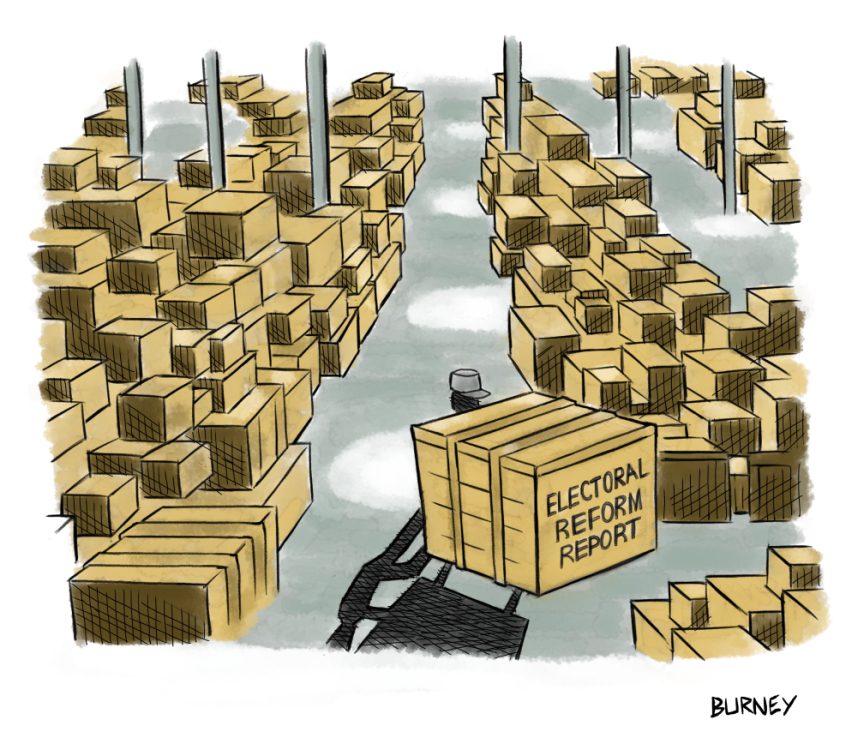News on Wednesday that Justin Trudeau had decided to break his promise that 2015 would be the last election under First-Past-the-Post was met by the expected howls of indignation from NDP and Green parties. The reason, Trudeau stated in the updated mandate letter for newly minted minister of democratic institutions, Karina Gould, was that a clear preference for a new electoral system had not been made, nor was there any kind of consensus, and there was no clear question by which to hold a referendum. Henceforth, changing the electoral system was no longer in her mandate.
In the face of angry denunciations in Question Period following the announcement, Trudeau stated that without any consensus on a system, this was not the right time to move forward on it. And while everyone tuts that this is him breaking a "major" electoral promise, let me state unequivocally that sometimes, breaking a bad promise is the right thing to do, and this was without a doubt, a really bad promise.
Let's go back to when it was made. It was summer of 2015, before the election had been called, the Liberals were still polling in third place, and Justin Trudeau summoned the media to the Chateau Laurier where he unveiled a package called "A Fair and Open Government" which contained 33 different items, ranging from improved access to information, free votes, Senate and Supreme Court of Canada appointments, and strengthening Elections Canada. The promise to "make every vote count" was one item buried in the middle of it. It wasn't highlighted or made prominent in any way. It was also phrased with a caveat baked right in, that everything would be studied and considered.
"We are committed to ensuring that 2015 will be the last federal election conducted under the first-past-the-post voting system. As part of a national engagement process, we will ensure that electoral reform measures such as ranked ballots, proportional representation, mandatory voting, and online voting are fully and fairly studied and considered. This will be carried out by a special all-party parliamentary committee, which will bring recommendations to Parliament on the way forward, to allow for action before the succeeding federal election. Within 18 months of forming government, we will bring forward legislation to enact electoral reform."
While the language of "making every vote count" is civically illiterate nonsense and the rallying cry of sore losers every vote already counts it's also important to remember that this was also an era where the accepted wisdom among pundits that we were in for an age of perpetual Conservative governments so long as the Liberals and NDP remained separate parties, and that they needed to "unite" in the same way the right side of the political spectrum did to form the modern Conservative party. This is part of the sentiment that the Liberals were responding to when they made this promise. Oh, and there was also no consensus within the party about what reform looked like. Trudeau personally favoured ranked ballots, but former leadership candidate Joyce Murray favoured proportional representation, and Stéphane Dion had written a proposal for multi-member ridings that would have resulted in some form an a single-transferable ballot system.
It was a bad promise, made without considering the consequences. It didn't need to be made given the scope and breadth of all of their other reform promises, and it would also have been nearly impossible to fulfill. It also had the very real possibility of undermining Trudeau's ability to govern for the next three years, leading up to the election, as any objections would be met by "You've admitted that your government isn't legitimate because you only got 39 percent of the vote." (Never mind that the 39 percent figure is a logical fallacy and doesn't actually exist, but that would be the talking point). This would only get worse as the election drew closer, as parliament would be further bogged down in not only the implementation of the new voting system, and the inevitable howls that each party was self-dealing in the process.
And then there was the question of the referendum that the Conservatives demanded as part of the process. If there is anything that Trudeau has become quite wary of in the wake of Brexit, the first Colombia peace agreement, and the proposed constitutional reforms in Italy, it's that referenda are dangerous things in an era of heightened populist sentiment
"It would be irresponsible to do something that harm's Canada's stability," Trudeau said in QP on Wednesday, and he's not wrong particularly as the government has its hands full dealing with the fallout of the Trumpocalypse to the south, and having electoral reform consume the time and attention of Parliament would be a drag on their ability to deal with what's going on, particularly if he undermined his own legitimacy by agreeing with the sentiments behind the drivers of reform.
And then comes the debate about whether politicians should always keep promises, even then they're bad ones. Is it worse that Trudeau and his minister have made the decision to smother this promise now, a little over a year into his mandate, admitting that this wasn't a wise policy to pursue at this time given the gong show results of the Electoral Reform special committee? Or would it have been better for him to drag this out and carry on the fiction of coming to some kind of compromise on the file over the next three years when that was a likely impossibility? Perhaps it's best that we acknowledge that sometimes governments should break bad promises, but also ensure that they own up to the fact that it was a bad promise to make in the first place. Will it cost him some votes? Maybe, but this isn't a burning issue for most Canadians. And given that the system actually isn't broken, not moving ahead with reform is the right thing to do.
Editorial Cartoon: Jeff Burney







